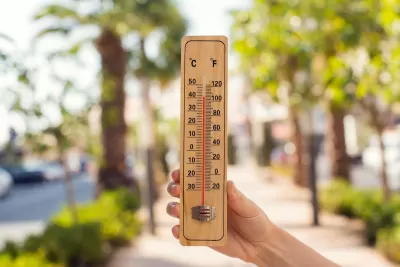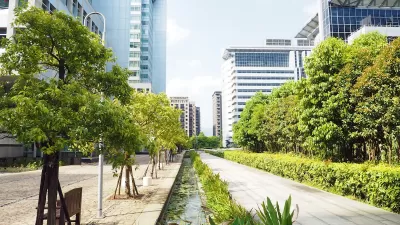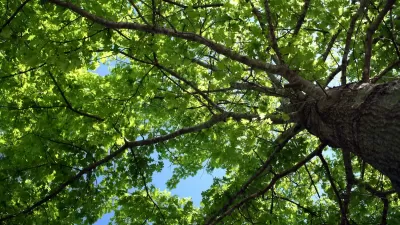A robust tree canopy can help reduce the urban heat island effect and lower air temperatures, but the impact is reduced as temperatures rise.

A new study from the University of New South Wales reveals that the ability of trees to combat overheating is reduced in extremely hot temperatures. “The findings, published in Sustainable Cities and Society, opens in a new window, show that conventional climate models overestimated the ability of trees to cool during heat waves by 60 per cent.”
The study poses a serious problem for cities relying on planting trees as a key part of their heat mitigation strategy. “It’s not to say that tree planting initiatives aren’t important for heat mitigation, but that large-scale planting policies require careful consideration,” said one of the study’s co-authors, Professor Mattheos (Mat) Santamouris.
As Ben Knight explains in the article, trees typically reduce surrounding air temperatures by 1 to 2 degrees Celsius in the daytime by releasing vapor through their leaves and absorbing heat. In high heat conditions, trees limit their transpiration, a factor not accounted for in current climate forecasts.
In the study’s sample of eucalyptus trees in Sydney, two-thirds of the trees were overestimated in their cooling ability during extreme heat by 60 percent. “Prof. Santamouris says decision-makers need to be more selective about the types of trees used and their various temperature thresholds. Under extreme temperatures, trees can also emit high concentrations of Biogenic Volatile Organic Compounds (BVOCs) like Isoprene, which can harm air quality when they interact with other atmospheric pollutants.”
Santamouris also warns that urban trees need adequate irrigation to provide optimal cooling benefits.
FULL STORY: Trees may not cool cities during heat waves as much as we thought

Planetizen Federal Action Tracker
A weekly monitor of how Trump’s orders and actions are impacting planners and planning in America.

Map: Where Senate Republicans Want to Sell Your Public Lands
For public land advocates, the Senate Republicans’ proposal to sell millions of acres of public land in the West is “the biggest fight of their careers.”

Restaurant Patios Were a Pandemic Win — Why Were They so Hard to Keep?
Social distancing requirements and changes in travel patterns prompted cities to pilot new uses for street and sidewalk space. Then it got complicated.

Platform Pilsner: Vancouver Transit Agency Releases... a Beer?
TransLink will receive a portion of every sale of the four-pack.

Toronto Weighs Cheaper Transit, Parking Hikes for Major Events
Special event rates would take effect during large festivals, sports games and concerts to ‘discourage driving, manage congestion and free up space for transit.”

Berlin to Consider Car-Free Zone Larger Than Manhattan
The area bound by the 22-mile Ringbahn would still allow 12 uses of a private automobile per year per person, and several other exemptions.
Urban Design for Planners 1: Software Tools
This six-course series explores essential urban design concepts using open source software and equips planners with the tools they need to participate fully in the urban design process.
Planning for Universal Design
Learn the tools for implementing Universal Design in planning regulations.
Heyer Gruel & Associates PA
JM Goldson LLC
Custer County Colorado
City of Camden Redevelopment Agency
City of Astoria
Transportation Research & Education Center (TREC) at Portland State University
Camden Redevelopment Agency
City of Claremont
Municipality of Princeton (NJ)





























